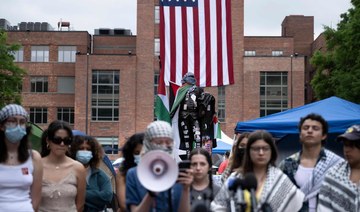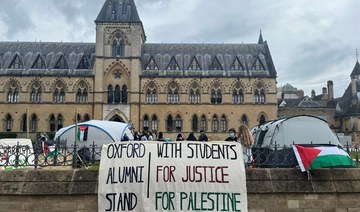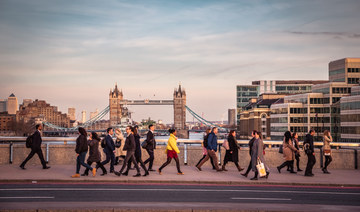CHICAGO: Police began dismantling a pro-Palestinian encampment early Thursday at DePaul University in Chicago, hours after the school’s president told students to leave the area or face arrest.
Officers and workers in yellow vests cleared out tents and camping equipment at the student encampment, leaving behind yellow squares of dead or dying grass where the tents had stood. Front-loaders were being used to remove the camping equipment.
Just across the street from where the encampment was spread across a grassy expanse of DePaul’s campus known as “The Quad,” a few dozen protesters stood along a sidewalk in front of a service station, clapping their hands in unison as an apparent protest leader paced back and forth before them, speaking into a bullhorn.
All of the protesters at the encampment “voluntarily left” the area when police arrived early Thursday, said Jon Hein, chief of patrol for the Chicago Police Department.
“There were no confrontations and there was no resistance,” he said at a news briefing. “As we approached, all the subjects voluntarily left the area.”
Hein said, however, that two people, a male and female in their 20s, were arrested outside the encampment “for obstruction of traffic.”
The move to clear the campus comes less than a week after the school’s president said public safety was at risk.
The university on Saturday said it had reached an “impasse” with the school’s protesters, leaving the future of their encampment on the Chicago campus unclear. Most of DePaul’s commencement ceremonies will be held the June 15-16 weekend.
In a statement then, DePaul President Robert Manuel and Provost Salma Ghanem said they believe that students intended to protest peacefully, but “the responses to the encampment have inadvertently created public safety issues that put our community at risk.”
Efforts to resolve the differences with DePaul Divestment Coalition over the past 17 days were unsuccessful, Manuel said in a statement sent to students, faculty and staff Thursday morning.
“Our Office of Public Safety and Chicago Police are now disassembling the encampment,” he said. “Every person currently in the encampment will be given the opportunity to leave peacefully and without being arrested.”
He said that since the encampment began, “the situation has steadily escalated with physical altercations, credible threats of violence from people not associated with our community.”
Students at many college campuses this spring set up similar encampments, calling for their schools to cut ties with Israel and businesses that support it, to protest lsrael’s actions in the war with Hamas. The protests began as schools were winding up their spring semesters and are now holding graduation ceremonies.
Separately, some students and faculty were detained Wednesday after police removed an encampment and pro-Palestinian protesters briefly took over a lecture hall at the University of California, Irvine. There was a large law enforcement response when demonstrators demanding the university divest from Israel blocked the building’s entrance with a makeshift barricade. Police declared an unlawful assembly, cleared the building and took an unknown number of people into custody.
Also Wednesday, 11 members of a group protesting at the University of Tennessee in Knoxville who did not vacate the area despite repeated warnings were arrested for trespassing, the university said in a statement. Those arrested included three students and eight people who are not affiliated with the university. Any students who were arrested will also be referred to student conduct, officials said.
“The University of Tennessee respects individual’s rights to free speech and free expression and is committed to managing the campus for all,” the university said in the statement. “We will continue to be guided by the law and university policy, neutral of viewpoint.”
Tensions at DePaul flared the previous weekend when counterprotesters showed up to the campus in the city’s Lincoln Park neighborhood and prompted Chicago police to intervene.
The student-led DePaul Divestment Coalition, who are calling on the university to divest from Israel, set up the encampment April 30. The group alleged university officials walked away from talks and tried to force students into signing an agreement, according to a student statement late Saturday.
“I don’t want my tuition money to be invested in my family’s suffering,” Henna Ayesh, a Palestinian student at DePaul and Coalition member, said in the statement.
DePaul is on the city’s North Side. Last week, police removed a similar encampment at the University of Chicago on the city’s South Side.
The Associated Press has recorded at least 79 incidents since April 18 where arrests were made at campus protests across the US More than 2,900 people have been arrested on the campuses of 60 colleges and universities. The figures are based on AP reporting and statements from universities and law enforcement agencies.
Police dismantle pro-Palestinian encampment at DePaul University in Chicago
https://arab.news/2rnq5
Police dismantle pro-Palestinian encampment at DePaul University in Chicago

- All of the protesters at the encampment “voluntarily left” the area when police arrived early Thursday
- The move to clear the campus comes less than a week after the school’s president said public safety was at risk
Indonesia pledges to increase UNRWA funding, send more medical teams to Gaza

- Jakarta calls for two-state solution, ready to support ceasefire plan
- President-elect Subianto set to meet Saudi crown prince in Jeddah
JAKARTA: Indonesia’s President-elect Prabowo Subianto has pledged to increase contributions to the UN’s Palestine agency and send more medical teams to Gaza, his office said on Wednesday.
Subianto, who is still serving as Indonesia’s defense minister before he takes the top office in October, on Tuesday attended an international aid conference on Gaza in Jordan, where he said the “humanitarian catastrophe” in the besieged strip must be addressed immediately.
“Indonesia is willing and ready to contribute to all efforts to lessen the suffering of our brothers and sisters in Palestine and we are hoping to work together with countries in the region,” he was quoted as saying in a Ministry of Defense statement.
During the conference, co-hosted by King Abdullah II, Egyptian President Abdel Fattah El-Sisi and UN Secretary General Antonio Guterres, Subianto said that “stronger support for an independent and sovereign Palestine” was the real solution to Israel’s war on Gaza, in which more than 37,000 Palestinians have been killed since October.
“We will significantly increase our contributions to UNRWA and other immediate humanitarian assistance. We are ready to deploy more medical teams and a field hospital to operate in Gaza,” Subianto said, adding that Indonesia was also ready to deploy its hospital ship and assist in humanitarian airdrops.
In December, Foreign Minister Retno Marsudi said Indonesia was going to triple its contributions to UNRWA. The Southeast Asian nation has also sent several aid shipments to Gaza.
Jakarta does not have diplomatic relations with Tel Aviv and has been one of the most vocal supporters of Palestine since the beginning of Israel’s onslaught on Gaza. It sees Palestinian statehood as mandated by its constitution, which calls for the abolition of colonialism.
Subianto also said Indonesia was willing to evacuate 1,000 patients to be treated in Indonesian hospitals, as well as children and orphans for post-trauma treatment and schooling, and return them all to Gaza once it was safe to do so.
“Although we are willing to support and contribute to all these efforts, the … final solution to this problem is a two-state solution,” he told the conference.
In a meeting with US Secretary of State Antony Blinken, Subianto said Indonesia was “ready to contribute” on all efforts to achieve an immediate ceasefire.
Last week, US President Joe Biden laid out what he called a “three-phase” Israeli proposal for a ceasefire in Gaza, which would include negotiations for a permanent ceasefire in the Palestinian enclave and also an exchange of some Israeli hostages for Palestinian prisoners.
Qatar and Egypt are now leading mediation efforts for the plan, which has since been adopted as a resolution by the UN Security Council.
“Indonesia is ready to work with the US, Egypt and Qatar to ensure that negotiations continue to achieve a permanent ceasefire and a just and lasting peace in Palestine,” Subianto told Blinken.
“An immediate, full and comprehensive ceasefire is essential to revive the peace process.”
Following his meetings in Jordan, Subianto traveled to Jeddah, where he is scheduled to meet Saudi Crown Prince Mohammed bin Salman.
Indian police blame Pakistan for Jammu and Kashmir strife that killed 12

- Spurt in militants in Jammu and Kashmir killed 12 people, injured dozens over last three days
- India has always accused arch-rival Pakistan of stoking militancy in disputed Himalayan territory
SRINAGAR: Police in India’s territory of Jammu and Kashmir blamed arch-rival Pakistan on Wednesday for a spurt in militant attacks that killed 12 people and injured dozens over the last three days, just weeks after a large turnout for general elections.
Pakistan claims the Himalayan region, which has been roiled by militant violence since the start of an anti-Indian insurgency in 1989 that killed tens of thousands, although violence has waned in recent years.
“Our hostile neighbor wants to damage our peaceful environment,” Anand Jain, police chief of Jammu, told reporters in a reference to Pakistan, which India has accused of stoking violence in the region for decades.
A spokesperson for Pakistan’s foreign ministry did not immediately respond to a request for comment from Reuters. It has denied such claims in the past, saying it has given only political and diplomatic support to the insurgency.
Gunbattles in the area on Tuesday killed two militants and a paramilitary soldier while injuring a civilian and six security personnel, authorities said.
The incidents came two days after nine Hindu pilgrims were killed and 41 injured when militants attacked a bus taking them to a Hindu shrine on Sunday, as Prime Minister Narendra Modi was sworn in for a third term.
The latest violence has prompted criticism of Modi by opposition parties demanding action against the perpetrators.
“Unless we talk to our neighbors we will not be able to solve the problem,” Farooq Abdullah, a former chief minister of the region, told news agency ANI, in which Reuters has a minority stake.
The sudden rise in violence comes after the region’s director general of police, R.R. Swain, said the number of local militants was dropping, although 70 to 80 foreign militants continue to be active.
“We are moving from resident terrorism to foreign terrorism,” Swain said last week.
Ties between the neighbors have been frozen since India ended the special status of Jammu and Kashmir state in 2019, splitting it into two federally administered territories.
On Monday, the leaders of the nuclear-armed rivals engaged in diplomacy on X as Pakistan’s Prime Minister Shehbaz Sharif and his elder brother and former three-time prime minister Nawaz Sharif posted congratulations to Modi for his third term.
In response, Modi said, “The well-being and security of our people shall always remain our priority.”
Extreme heat triggers novel insurance payout for 50,000 women in India

- 50,000 self-employed women in India have become first beneficiaries of insurance scheme that pays out when temperatures hit certain extremes
- As the temperature crossed 40 degrees Celsius between May 18-25, women in the states of Rajasthan, Gujarat and Maharashtra all received $5 payment
LONDON: A group of 50,000 self-employed women in India have become the first beneficiaries of a novel insurance scheme that pays out when temperatures hit certain extremes.
As the temperature crossed 40 degrees Celsius (104 degrees Fahrenheit) between May 18 and May 25, the women in the states of Rajasthan, Gujarat and Maharashtra all received a flat $5 payment.
“This is the first time that insurance payouts and a direct cash assistance program have been combined to supplement the income of women when it’s dangerously hot,” said Kathy Baughman McLeod, CEO of non-profit Climate Resilience for All, which designed the insurance scheme along with India’s Self-Employed Women’s Association (SEWA).
The bulk of the women, some 92 percent, then went on to receive an additional payout when insurance tied to the local conditions and duration of the extreme heat was triggered, with some receiving up to $19.80 each.
Insurance is increasingly seen by policymakers as a tool to help vulnerable communities receive financial support quickly after extreme weather events occur.
Total payments across the program totalled $341,553.
WHO confirms human case of bird flu in India

- Patient admitted to pediatric ICU of local hospital in February, discharged three months later after diagnosis and treatment
- Patient, who had exposure to poultry at home, had persistent severe respiratory issues, high fever and abdominal cramps
NEW DELHI: The World Health Organization on Tuesday said a case of human infection with bird flu caused by the H9N2 virus was detected in a four-year-old child in the eastern Indian state of West Bengal.
The patient was admitted to the pediatric intensive care unit (ICU) of a local hospital due to persistent severe respiratory issues, high fever and abdominal cramps in February, and was discharged three months later after diagnosis and treatment, the WHO said.
The patient had exposure to poultry at home and in his surroundings, and there were no known person reporting symptoms of respiratory illness among his family and other contacts, the agency said.
Information on the vaccination status and details of antiviral treatment were not available at the time of reporting, the WHO added.
This is the second human infection of H9N2 bird flu from India, with the first in 2019, the agency said.
While the H9N2 virus typically tends to cause mild illness, the United Nations agency said that further sporadic human cases could occur as this virus is one of the most prevalent avian influenza viruses circulating in poultry in different regions.
An immediate response from the Indian health ministry was not available during late hours.
Only 24% percent of Britons think country should be outside EU, report finds

- Around 40 percent of Leave voters feel that the economy is worse off as a result of Brexit, compared to 18 percent who felt that would be the case in 2019
LONDON: Only a quarter of Britons believe the country should be outside the European Union, according to a report published on Wednesday, the lowest proportion since the 2016 vote to leave the bloc.
Britain will hold a national election on July 4, its first since the country formally left the EU in 2020. Despite Europe having long been a divisive topic in British politics, the issue of Brexit has barely featured so far in the election campaign.
The British Social Attitudes survey, carried out by the National Center for Social Research, found 24 percent said Britain should be outside the EU, compared to 36 percent in 2019 and 41 percent in 2016.
It also found the impact of Brexit on issues such as the economy and immigration was regarded more negatively now than in 2019, when the last election was held. The change was particularly marked among those who voted ‘Leave’ in 2016.
Around 40 percent of Leave voters feel that the economy is worse off as a result of Brexit, compared to 18 percent who felt that would be the case in 2019. Nearly two-thirds now believe immigration is higher as a result of leaving the EU, compared with just 5 percent who previously expected that would be the case.
“In short, it appears that for many of those who voted to leave the EU, Brexit has not turned out as they anticipated,” the report, co-authored by polling expert John Curtice, said.
The survey of 5,578 people, carried out between Sept. 12 and Oct. 31 last year, also found public trust and confidence in government had fallen to record lows, with 45 percent ‘almost never’ trusting British governments to put the needs of the nation above the interests of their own political party.


















